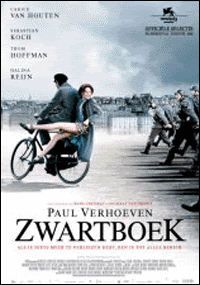 Paul Verhoeven’s career arc has been a strange one: after establishing himself in the Netherlands with thrillers like Soldier of Orange and The Fourth Man, he arrived in hollywood to direct a curious, sensationalistic string of popcorn movies belying an obsession with the extremes of both violence and sexuality. some were good (Robocop and Starship Troopers are as fun as sci-fi satire gets) and some weren’t (remember Hollow Man? on second thought, don’t) but all of them reflect surprisingly deeply on a slick artist undaunted by america’s cineplex conservatism. And though it was perhaps inevitable that Verhoeven would return to Europe and his filmmaking roots, few could have expected the resulting Zwartboek (Black Book), which stands as one of his finest achievements even as it out-hollywoods his american work in many key ways.
Paul Verhoeven’s career arc has been a strange one: after establishing himself in the Netherlands with thrillers like Soldier of Orange and The Fourth Man, he arrived in hollywood to direct a curious, sensationalistic string of popcorn movies belying an obsession with the extremes of both violence and sexuality. some were good (Robocop and Starship Troopers are as fun as sci-fi satire gets) and some weren’t (remember Hollow Man? on second thought, don’t) but all of them reflect surprisingly deeply on a slick artist undaunted by america’s cineplex conservatism. And though it was perhaps inevitable that Verhoeven would return to Europe and his filmmaking roots, few could have expected the resulting Zwartboek (Black Book), which stands as one of his finest achievements even as it out-hollywoods his american work in many key ways.Black Book tells the story of german jew Rachel Steinn (Carice van Houten) as she hides out among the dutch resistance toward the end of world war II, gradually taking on an active espionage role after she befriends german officer Ludwig Müntze (The Lives Of Others’ Sebastian Koch) and is offered a job inside SD headquarters. to elaborate much further would be both confusing and a disservice to the film, as Verhoeven and co-screenwriter Gerard Soeteman pack the film with a serpentine, almost Hitchcockian series of twists and turns that constantly confront Rachel (spending most of the film under the pseudonym Ellis de Vries) as she pursues not only safety but justice.
being a Paul Verhoeven picture, of course, the film is steeped in both graphic, affecting violence and unabashed sexuality, but where his american work seemed to revel in its excesses and indulgences, Black Book folds these preoccupations organically into the story, and lets Verhoeven concentrate on its telling. and it’s here that the hollywood influence shows – not in any of the ways his american films might suggest, but a more classical sense, from the austere period sensibility and low-key glossiness to Anne Dudley’s pitch-perfect score and van Houten’s rapturously confident, star-making performance. the most potent contribution to the film’s americanized aesthetic, though, is a decided emphasis on entertainment over the themes and grand ideas we’ve come to expect from european resistance dramas: Black Book is a thriller, plain and simple, and a rousing one at that.
still, there’s a creative maturity in the way such an entertainment is approached. sentimentality is one hollywood tradition that Verhoeven never had much use for, and Black Book is little different in that respect, putting forth a comparatively chilly narrative tone that doesn’t manipulate its audience by lingering unnecessarily on the emotions in play. one of the more obvious dividends of this approach is an enhanced brutality, most noticeable in the harrowing firefights but also observable on an emotional level throughout the film, particularly in Rachel’s subtly escalating psychological humiliation at the hands of the SD officer unknowingly responsible for her family’s deaths. more crucially, this lack of sentimentality also allows for an enriching idealistic relativism; both the subtext and the story itself are informed by the notion that all people, even in times of such great wickedness, tread the gray waters between good and evil.
(from the KNOXVILLE VOICE)




No comments:
Post a Comment